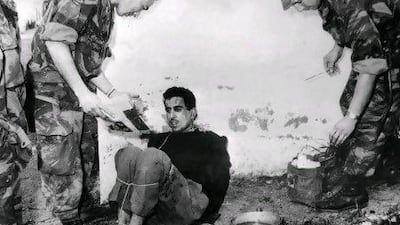ALGIERS // Three grainy photos hanging in an official exhibition in Paris that show French soldiers torturing an Algerian are perhaps the closest France has come to a public acknowledgement of the darkest period of its history.
As Algeria celebrated 50 years of nationhood yesterday, the two countries remain locked in a war of memories that still weighs heavy on both sides.
There have been no apologies from France for the brutal eight-year war that ended 132 years of French rule in the North African country. There is no reconciliation.
"Time is not sufficient" to make the wounds on both sides disappear, said Benjamin Stora, a leading French historian on the era. "We see that the more time passes, the more memory returns, he added. This must be treated" because the problem will not go away "by magic", he warned.
President Abdelaziz Bouteflika kicked off Algeria's commemorations yesterday, laying a wreath at the soaring monument dedicated to the Algerian "martyrs" who lost their lives during the war.
Algeria says 1.5 million people died during the 1954-1962 revolution. That figure is contested by historians who believe 300,000-400,000 lost their lives - which is still more than the number of French killed in World War I. It compares with about 30,000 French soldiers killed in Algeria.
"Colonisation brought the genocide of our identity, of our history, of our language, of our traditions," Mr Bouteflika said on Algerian television in 2006.
As Algeria was winning independence, one million Europeans left for mainland France.
There is also unreconciled tension around the harkis, Algerian peasants who fought on the side of the French and died by the tens of thousands. "There is no equivalent in history," Mr Stora said. "Algeria was a land that disappeared, a land that no longer existed that was called French Algeria."
Hundreds of French troops were deployed but the war, which began with an armed insurrection by Algerians, was unwinnable for France. General Charles de Gaulle, was forced to negotiate Algeria's independence.
As the ceasefire anniversary approached in March, Algeria's powerful National Organisation of Mujaheddin, those who fought in the war, tried to re-energise a parliamentary bill that would condemn France's colonial past.
That bill was an apparent response to a law passed by the French parliament in 2005 requiring textbooks to show the "positive role" France played in its former colonies. The then-president, Jacques Chirac, later rescinded it.
A statement in March by Algeria's National Liberation Front, or FLN, the direct heir of the organisation that fought the French - and Algeria's ruling party for nearly three decades - put forth its "immutable position" that France must acknowledge "its crimes against Algerians".
In an exhibition hall at the French Army Museum in Paris, under the roof of the gold-domed Invalides where Napoleon is buried, there is a quiet effort under way to own up to one rarely spoken truth. Three photos of French soldiers inflicting torture hang in a corner.
One, taken in 1957, shows a naked man strung upside down, hands and feet attached to a wooden plank, and a Frenchman wielding a stick.
Part of an exhibition that is devoted to the French conquest, the war and the evacuation, the photographs depicting French torture are a first.
The photographer, Jean-Philippe Charbon, refused their publication while he was alive.
"We can't recount this history without evoking torture," said Lieut Col Christophe Bertrand, one of three curators of the exhibition. "The army has carried the burden," he added. A video showing ghastly scenes of the torture of a French soldier by FLN fighters is also on display at the exhibition.
Diplomatic ties between France and Algeria have been up and down but a friendship treaty to make the two countries privileged partners, which was to have been signed in 2005, is still on hold.
"This war is still a prisoner of the ideology of the state", making it hard to move forward, or even allow historians to uncover facts, Mr Stora said.
What is needed, he said, is a political gesture from France.

